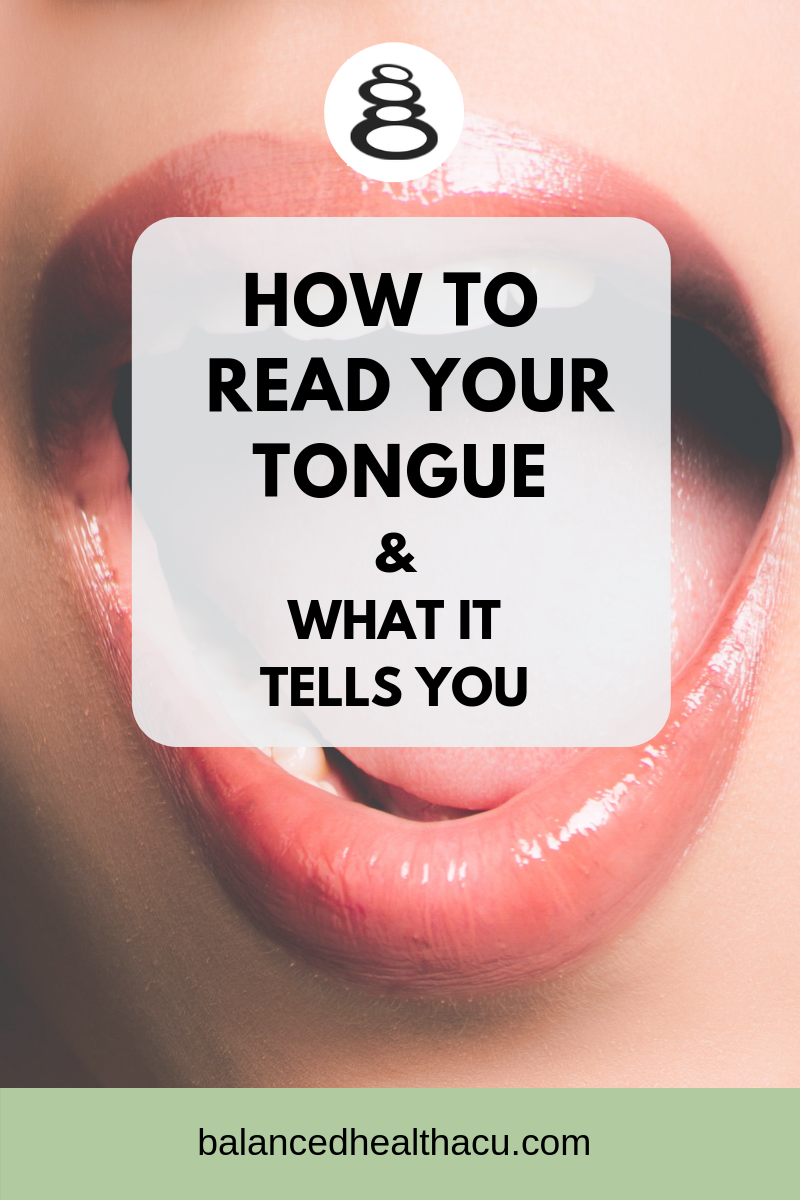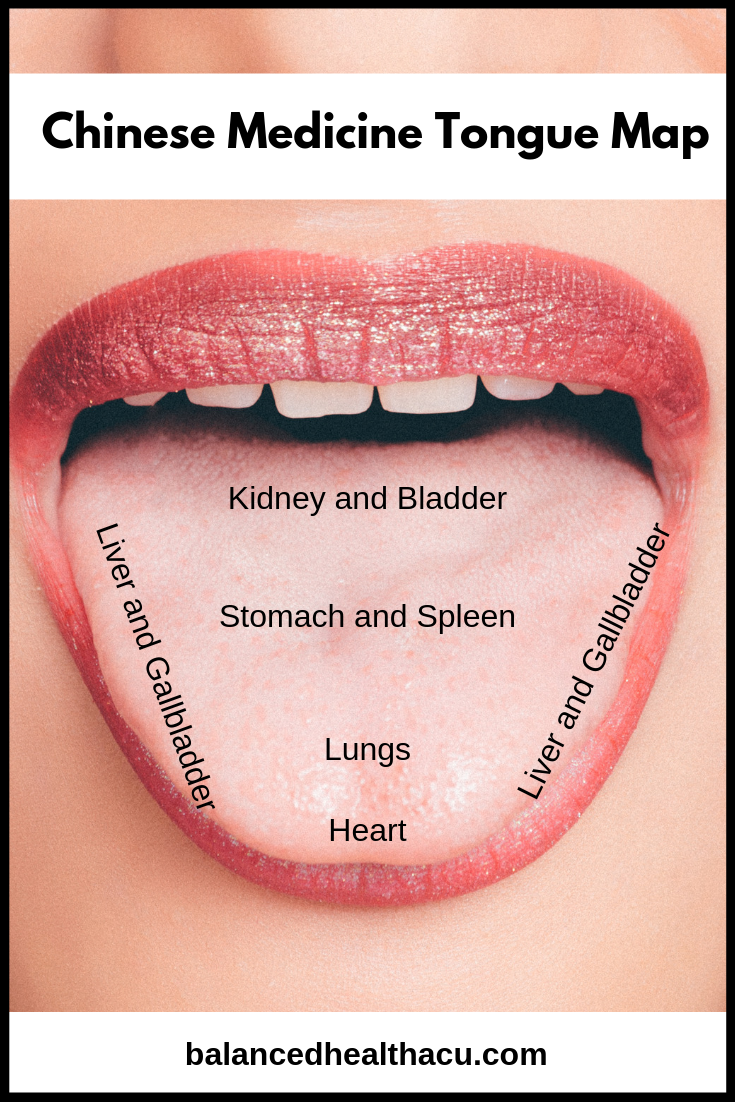How to Read Your Tongue & What It Tells You
It never fails that I always get this funny look from a new patient whenever I ask them to stick their tongue out at me. But I always reassure them that yes, I really do what to look at it because your tongue can tell me (and you!) so much.
What exactly am I looking at?
Well read on to learn how you can read your tongue and what your tongue tells you about your health.
The tongue is just one point of observation that an acupuncturist will look at when you come in for a treatment.
The tongue offers several valuable clues to the underlying imbalances in your body that are contributing to or are the root cause of your health condition.
Who knew that the tongue could “tell” you so much?
*Before continuing, stop here and go grab a hand mirror. As you read on, check out your own tongue and see what it’s telling you!
So, what exactly is an acupuncturist looking at when they look at your tongue and what can it tell you about your health?
With each of my patients, I look at 5 different components of the tongue to assist in formulating my diagnosis:
Color
Shape
Coating
Moisture
Areas of the Tongue
A “normal” tongue will be pink in color, moderate and flexible in shape with a light white coating and slight moist. Any deviations from this can indicate an imbalance we want to correct.
Color of the Tongue
The first observation that I make is the color of the tongue.
Your tongue color reflects the state of your body’s blood and energy as well as the presence of any heat or cold conditions.
The two most common tongue colors that I see are pale and red.
A pale tongue can alert me to the fact that someone may be blood deficient.
A blood deficiency could stem from heavy periods or hemorrhaging, a diet lacking in blood building foods such as meat, or even from overwork or excess stress and anxiety.
Someone with a pale tongue may have difficulty falling asleep, suffer from anxiety, fatigue or dizziness, struggle with migraines, or have frequent muscle, tendon or ligament injuries.
A red tongue is another common finding which can signal heat in the body or blood.
I would expect to see a red tongue in someone who drinks alcohol or smokes, represses anger, impatience or other emotions, has night sweats or hot flashes, insomnia with active dreams or nightmares or who suffers from constipation, skin problems or high blood pressure.
A red tip tongue could be found in someone who has a lot of worry or anxiety.
Tongue Shape
Tongue shape provides clues to the state of the body’s organs, energy and blood.
A tongue could be thin or swollen, long or short, or have teeth marks or cracks. I most often see tongues that are swollen or have teeth marks.
A swollen tongue indicates the presence of dampness in the body.
This dampness can be in the form of edema, excess weight, phlegm or even a yeast infection. A tongue that is just swollen in the front, for example, indicates phlegm in the lungs.
A tongue that has swollen sides and teeth marks indicates a weakness in the digestive system.
Someone who has frequent gas or bloating, loose bowel movements, a poor appetite, or a poor diet will often have a swollen tongue or one with teeth marks.
Tongue Coating
Tongue coating reflects the state of your digestion as well as the presence of any pathogenic factor such as a cold causing virus.
Because the coating reflects the state of your health, it’s important to not brush your tongue, especially before an acupuncture treatment.
A tongue coating that is yellow indicates a heat condition in the body, which could manifest as a sore throat, bronchitis, or other heat causing illness.
I often also see a tongue that has no coating. This is most commonly seen in menopausal woman who are experiencing hot flashes or night sweats because the tongue coating is being dried up from the internal heat.
Tongue Moisture
Tongue moisture reflects the state of the body’s fluids.
A wet tongue with too much moisture shows that the body’s fluids are not moving but are accumulating in the body.
A tongue that is dry indicates a heat condition that is drying up the body’s fluids.
A tongue may also be sticky reflecting dampness in the body or phlegm production.
Areas of the Tongue
Areas of the tongue also correspond to specific internal organs of the body.
Observing specific areas of the tongue can therefore provide clues to the health of each organ system in the body.
As you can see in the image of the tongue map, the tip of your tongue reflects your heart and the area behind the heart reflects the lungs.
The sides of your tongue reflect the liver and gall bladder while the middle reflects the stomach and spleen organ systems.
The back of your tongue reflects your bladder and kidneys.
So now it’s your turn. Hold up your mirror and take a look at your tongue!
What color is it? Does it have a particular shape or any markings such as cracks or teeth marks? Does it have a coating? If so, what color is it and how thick is it? How moist is your tongue?
Do any areas of your tongue stand out to you that could reflect what’s going on with an internal organ system?
Tongue observation is just that - observing aspects of the tongue to give us clues about our health.
If something stands out to you, don’t panic, but take the time to reflect on what it might mean.
At your next acupuncture appointment, take a look with your acupuncturist and have a discussion together about what your tongue is telling you.
Can you read your tongue? Share in the comments below!
Related Posts:
How to Pick the Right Acupuncturist for You
Why You Should Choose Acupuncture


